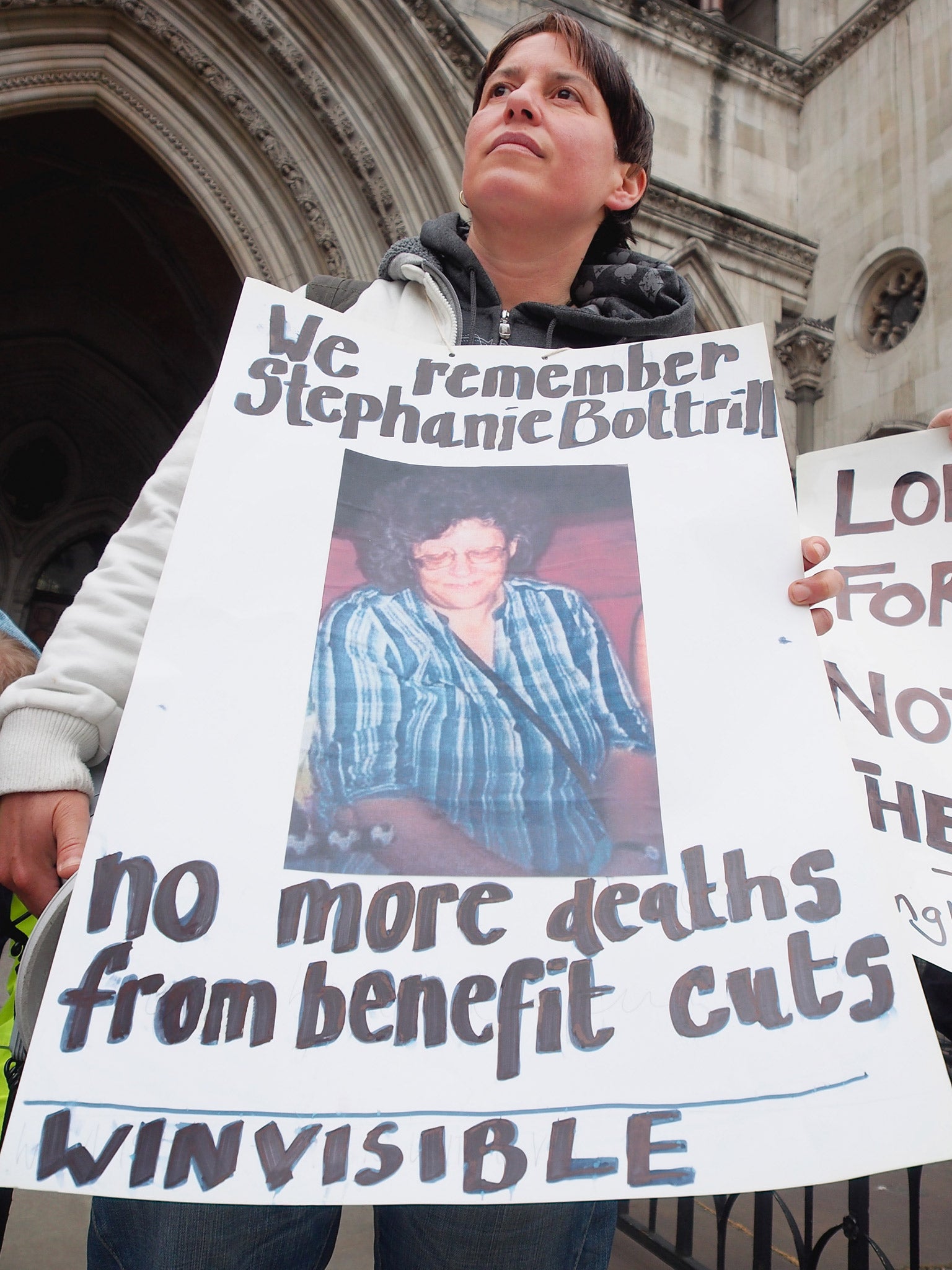Stephanie Bottrill, who blamed the bedroom tax for her suicide, had history of depression, inquest hears

Your support helps us to tell the story
From reproductive rights to climate change to Big Tech, The Independent is on the ground when the story is developing. Whether it's investigating the financials of Elon Musk's pro-Trump PAC or producing our latest documentary, 'The A Word', which shines a light on the American women fighting for reproductive rights, we know how important it is to parse out the facts from the messaging.
At such a critical moment in US history, we need reporters on the ground. Your donation allows us to keep sending journalists to speak to both sides of the story.
The Independent is trusted by Americans across the entire political spectrum. And unlike many other quality news outlets, we choose not to lock Americans out of our reporting and analysis with paywalls. We believe quality journalism should be available to everyone, paid for by those who can afford it.
Your support makes all the difference.A woman who left suicide notes to her family blaming the bedroom tax for making her want to end her life was under “considerable anxiety and stress”, an inquest has found.
The case of Stephanie Bottrill, 53, became emblematic of opposition to the controversial welfare reform after her son Steven spoke out about its devastating impact on her last year. But in an extraordinary outburst after the inquest at Birmingham Coroner’s Court today, her brother Kevin Owen said Mrs Bottrill had used the bedroom tax as an “excuse” and that she should have given up her home to others who needed it.
Mrs Bottrill lived alone in her three-bedroom terraced home in Kingshurst in Solihull after her two grown-up children moved out. This meant that under the Department for Work and Pensions’ welfare reforms she received less housing benefit every week - effectively meaning she was charged for the unused rooms.
The extra £20 a week in housing costs meant she ran out of money for food and was reluctantly preparing to move out. The former postal worker had been suffering from depression on and off for 20 years and had agreed to see her GP the day before her death after her family expressed concern.
She was planning to move to a smaller property but was distraught at having to leave the home she had brought up her family in for nearly two decades. In a final note left for her son Steven, she said: “Don't blame yourself for me ending my life. The only people to blame are the Government.”
The grandmother died of multiple injuries after stepping into a motorway. The area coroner for Birmingham and Solihull, Zafar Siddique, said that because of the notes she left he was “satisfied she intended to take her own life”.
Her GP, Dr Bindu Nair, said in a written statement to the coroner: “She informed me she had called her children in the early hours of 3 May 2013, saying she couldn't cope with the stress and wanted to end it all, and had written a note planning to jump off a bridge.”
Dr Nair added: “She expressed unhappiness at being pushed by the housing department to make a decision in half an hour, in reference to being made to move into a smaller property.”
He added that Ms Bottrill was “happy to move but it was the way in which she was forced to make a decision” which had caused her “considerable anxiety and stress”.
Solihull Metropolitan Borough Council said it “would never ask anyone to decide something that important in half an hour.”
Mrs Bottrill’s 28-year-old son Steven has previously spoken about his anger at the impact the bedroom tax had on his mum. Speaking on live television last year, he said: [the Government] need to rethink it. They’re just picking on the vulnerable people like my mum and they need to offer more help and rethink the law.”
But after the inquest, Steven’s uncle, Kevin Owens, spoke in support of the policy, saying: “For social housing to work it needs for everybody to take a turn. When you're adequately housed by successive governments, and your needs are met, you must give somebody else a turn.
“It’s terrible that people in this country are cramped into one and two-bedroom flats with children while other people sit on three bedroom houses. Our thoughts go out to the lorry driver whose life has been blighted by this, and we just wanted to pass on our thoughts to him.”
Mr Owens contradicted his sister’s claim of being forced into a decision. “She wasn't prepared to give somebody else a chance as far as I'm concerned, he said, adding: “Much has been written about bedroom tax pushing her - it wasn't, because prior to that she'd attempted suicide before and that hadn't been reported before.
“It might have been the catalyst to push her but, was it just an excuse she was looking for? That's all I've got to say.”
A spokeswoman for the Department of Work and Pensions would not confirm whether anyone from Government had spoken to the family since the incident. She said “This is a tragic case and our sympathies are with the family of Mrs Bottrill. The council was working closely and supporting Mrs Bottrill with the changes.”
A loophole in the law discovered after she died meant Mrs Bottrill would actually have been exempt from the charge because she had lived in her home continuously on housing benefit since before 1996.
For any readers seeking confidential support, call Samaritans 08457 90 90 90 or visit a local Samaritans branch.